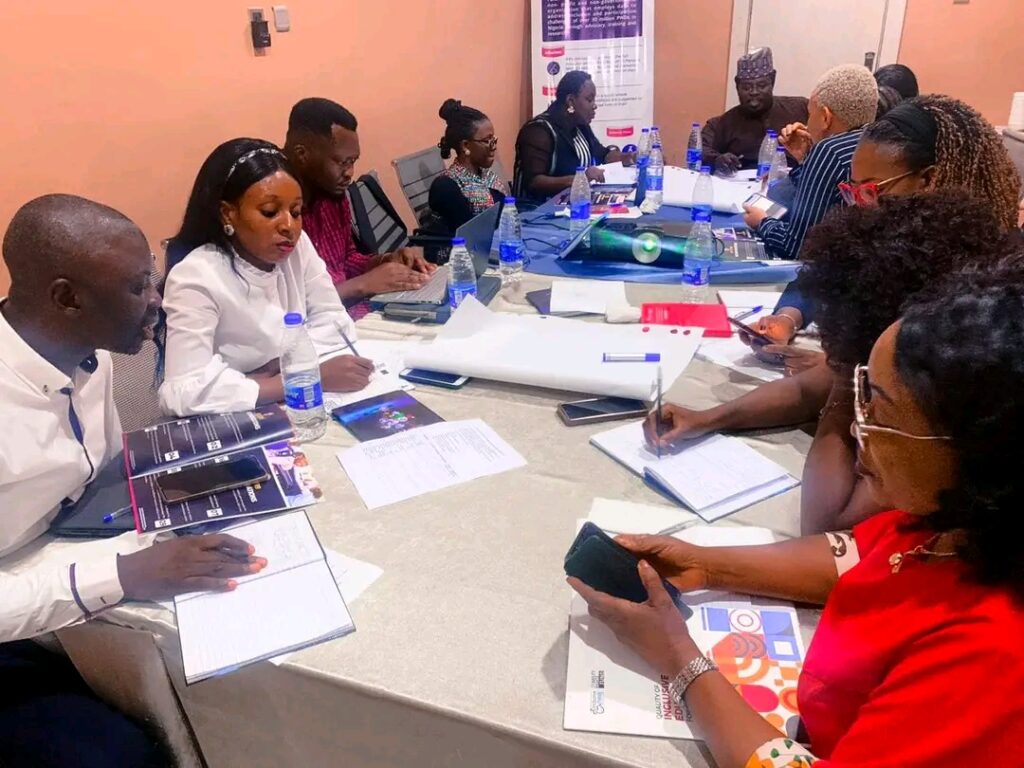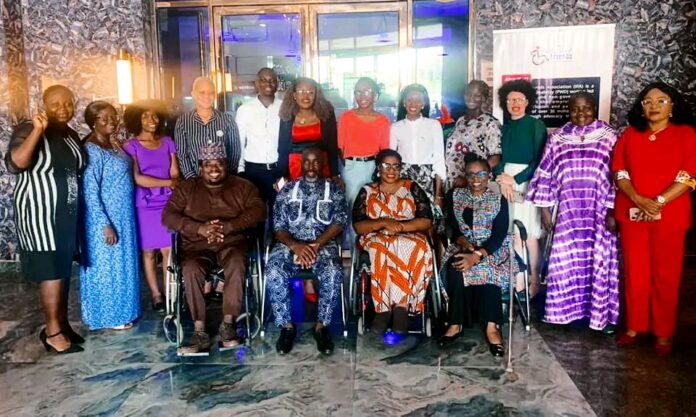Inclusive Friends Association (IFA) on Tuesday made a public presentation of their research findings into the barriers and challenges bedeviling quality inclusive education (QIE) for children with disabilities (CWDs) in the FCT.
In the presentation event which took place in Abuja, The Executive Director of Inclusive Friends Association IFA, Grace Jerry informed that the research was supported by Disability Rights Fund (DRF) to enhance the implementation of Inclusive Education Policy in the FCT.
Speaking further, she said that apart from presenting the research findings, the meeting is also to bring together different Organizations of Persons With Disabilities (OPDs) working on Inclusive Education and relevant MDAs to synergize towards achieving the implementation of Inclusive Education in the FCT.
Dr. Adebukola Adebayo during his presentation on the findings of the Baseline research on Barriers hindering Access of Children with disabilities to Basic Education in the Federal Capital Territory, Abuja stated that barriers to the realization of quality inclusive education for children with disabilities are broken into three which are Attitudinal, Institutional and Environmental Barriers.
Other barriers are cultural/religious beliefs, poverty and lack of proper awareness on the part of some parents of Children with disabilities.
He pointed out the seriousness of the denial of access to Basic Education to children with disabilities stating that 40 percent of the out of 10million out of school children in Nigeria are children with disabilities and again over 90 percent of children with disabilities cannot access education.
He acknowledged the efforts of the government towards Inclusive Education because there are policies and laws put in place towards addressing it.
“There are 7 legal documents to address inclusive education in Nigeria but the implementation is the problem. There is National Policy on Inclusive Education, Section 17 to 20 of Discrimination against Persons with Disabilities (Prohibition) Act 2018 talks about Inclusive Education and many other local and international laws and treaties”
He proffered solution to be that there would change of attitude, the policies and laws put in place be implemented, and the environment made systematic to enhance inclusion.
Adebayo also said that special schools that we have been practicing over the years do not promote social inclusion, it is also contributing to the increase in number of Children with disabilities who are out of school because most of special schools are far away from many of them and once their parents can’t afford it, their children remain without attending any school. He advocated for all schools to be made inclusive and it should be inclusive of what it is not the mainstreaming and integration that has been practicing in Nigeria which provides little or no learning experience between children with disabilities and their counterparts without disabilities.

The research findings shows that access to QIE for children with disabilities in the FCT is hindered by numerous factors, including lack of accurate assessment/diversity enrollment mechanism, inadequate suitably qualified special education teachers, poor understanding of what inclusive education means, Inaccessible physical environment and facilities (absence of ramps and rails etc), absence of inclusive teaching aids and learning materials, stigmatization and discrimination from some of the staff and pupils, overcrowded classrooms, Lack of funds and poor implementation of the National Inclusive Education policy,
The research makes several recommendations which includes:
- Accurate assessment mechanisms should be developed by experts on inclusive education to help determine the needs of learners with disabilities and the placement of children with disabilities in the right classrooms.
- The government should carry out capacity strengthening training for teachers on the different types of disabilities and the different needs of learners with disabilities.
- A capacity strengthening training on what inclusive education is should be conducted for all stakeholders in the education sector.
- Special education should be made compulsory for all intending teachers during their tertiary education/teacher training.
- Frequent training and retraining of teachers should be practiced to update them with trends in achieving sustainable and inclusive education at the primary school level.
- The government should carry out an accessibility audit and upgrade the school structure and facilities to ensure it is accessible for learners with disabilities in their respective schools.
- Teachers should adopt the use of inclusive teaching aids and learning materials while teaching. This will increase the level of understanding of learners with disabilities in their various subjects.
- Disability is acquired not chosen, hence, there should be effective consequences against pupils or staff involved in discriminatory activities against learners with disabilities.
- Government should increase and prioritize the funds allocated for education to meet the UNESCO standards of 15-20% of annual budget. This will solve the problem of insufficient resources leading to low implementation.
- Ministries Departments and Agencies responsible for implementation of the National Policy on Inclusive Education should develop implementation guidelines to monitor proper implementation towards increasing the level of inclusivity and accessibility to education for children with disabilities in the FCT.
- There should be an increased partnership between MDAs CSOs and OPDs on proper implementation and progress tracking of the National Policy on Inclusive Education.
- Government should remodel more primary schools in the FCT, provide assistive teaching and learning devices and employ more suitably qualified teachers to make the schools conducive for children with disabilities to access basic education from early age.
- There should be a development of an inclusive Education Manual for school heads and classrooms teachers both special and regular for daily guidance on implementation of inclusive education.
- To help make sure that these rights are out into practice, the government should hire teachers who are persons with disabilities, teachers who are qualified in Braille and sign languages, and will train teachers and staff at all levels education on how to give quality education to people with disabilities.
The participants developed action plans on how to actualize these recommendations.
They agreed to form Action Working Group to enhance the implementation of National Policy on Inclusive Education in the FCT.
The participants drawn from MDAs on education, OPDs working on Inclusive Education.


